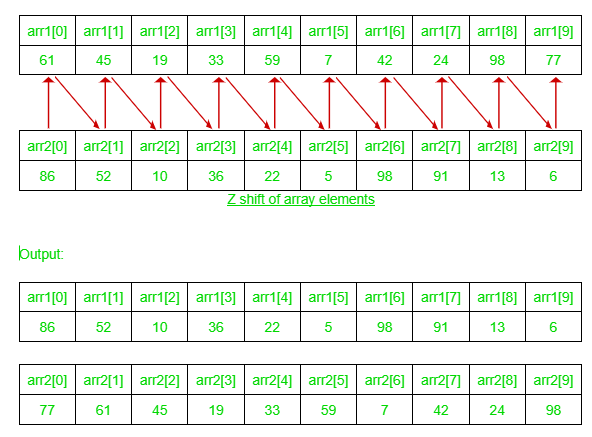Shift the elements between two arrays in Z form
Last Updated :
11 Sep, 2023
Given two arrays arr1[] and arr2[] both of size N, the task is to shift each element of the cell in Z form such that arr2[0] is in arr1[0], arr1[0] is in arr2[1], arr2[1] is in arr1[1] and so on and arr1[N-1] is in arr2[0].
Examples:
Input: arr1[] = {61, 45, 19, 33, 59, 7, 42, 24, 98, 77}
arr2[] = {86, 52, 10, 36, 22, 5, 98, 91, 13, 6}
Output: arr1[] = {86, 52, 10, 36, 22, 5, 98, 91, 13, 6}
arr2[] = {77, 61, 45, 19, 33, 59, 7, 42, 24, 98}
Explanation:

Input: arr1[] = {6, 24, 39, 99, 67}
arr2[] = {12, 84, 9, 13, 5}
Output: arr1[] = {12, 84, 9, 13, 5}
arr2[] = {67, 6, 24, 39, 99}
Approach: Let’s understand how the function zshift works step by step:
- The variable
t is assigned the last element of arr1, which will be used for swapping later.
- The loop starts from the last index (
N-1) and iterates down to the second index (1).
- Inside the loop, the current element of
arr2 is assigned to the corresponding index in arr1, and the previous element of arr1 is assigned the current element of arr2. This process effectively shifts the elements in a Z-form between the arrays.
- After the loop, the first element of
arr2 is assigned to the first element of arr1, and the original last element of arr1 (stored in t) is assigned to the first element of arr2. This finalizes the shifting process.
Below is the implementation of the above approach:
C++
#include <bits/stdc++.h>
using namespace std;
void zshift(int* arr1, int* arr2, int N)
{
int t = arr1[N - 1];
for (int i = N - 1; i >= 1; i--) {
arr1[i] = arr2[i];
arr2[i] = arr1[i - 1];
}
arr1[0] = arr2[0];
arr2[0] = t;
}
int main()
{
int arr1[] = { 61, 45, 19, 33, 59, 7, 42, 24, 98, 77 };
int arr2[] = { 86, 52, 10, 36, 22, 5, 98, 91, 13, 6 };
int N = sizeof(arr1) / sizeof(arr1[0]);
zshift(arr1, arr2, N);
for (int i = 0; i < N; i++)
cout << arr1[i] << " ";
cout << endl;
for (int i = 0; i < N; i++)
cout << arr2[i] << " ";
return 0;
}
|
Java
import java.util.Arrays;
class GFG {
public static void zshift(int[] arr1, int[] arr2, int N)
{
int t = arr1[N - 1];
for (int i = N - 1; i >= 1; i--) {
arr1[i] = arr2[i];
arr2[i] = arr1[i - 1];
}
arr1[0] = arr2[0];
arr2[0] = t;
}
public static void main(String[] args)
{
int arr1[]
= { 61, 45, 19, 33, 59, 7, 42, 24, 98, 77 };
int arr2[]
= { 86, 52, 10, 36, 22, 5, 98, 91, 13, 6 };
int N = arr1.length;
zshift(arr1, arr2, N);
for (int i = 0; i < N; i++)
System.out.print(arr1[i] + " ");
System.out.println();
for (int i = 0; i < N; i++)
System.out.print(arr2[i] + " ");
System.out.println();
}
}
|
Python3
def zshift(arr1, arr2, N):
t = arr1[N - 1]
for i in range(N - 1, 0, -1):
arr1[i] = arr2[i]
arr2[i] = arr1[i - 1]
arr1[0] = arr2[0]
arr2[0] = t
arr1 = [61, 45, 19, 33, 59, 7, 42, 24, 98, 77]
arr2 = [86, 52, 10, 36, 22, 5, 98, 91, 13, 6]
N = len(arr1)
zshift(arr1, arr2, N)
for i in range(0, N, 1):
print(arr1[i], end=" ")
print()
for i in range(0, N, 1):
print(arr2[i], end=" ")
|
C#
using System;
public class Program {
static void ZShift(int[] arr1, int[] arr2, int N)
{
int t = arr1[N - 1];
for (int i = N - 1; i >= 1; i--) {
arr1[i] = arr2[i];
arr2[i] = arr1[i - 1];
}
arr1[0] = arr2[0];
arr2[0] = t;
}
public static void Main(string[] args)
{
int[] arr1
= { 61, 45, 19, 33, 59, 7, 42, 24, 98, 77 };
int[] arr2
= { 86, 52, 10, 36, 22, 5, 98, 91, 13, 6 };
int N = arr1.Length;
ZShift(arr1, arr2, N);
foreach(int num in arr1)
{
Console.Write(num + " ");
}
Console.WriteLine();
foreach(int num in arr2)
{
Console.Write(num + " ");
}
}
}
|
Javascript
function zShift(arr1, arr2, N) {
const t = arr1[N - 1];
for (let i = N - 1; i >= 1; i--) {
arr1[i] = arr2[i];
arr2[i] = arr1[i - 1];
}
arr1[0] = arr2[0];
arr2[0] = t;
}
const arr1 = [61, 45, 19, 33, 59, 7, 42, 24, 98, 77];
const arr2 = [86, 52, 10, 36, 22, 5, 98, 91, 13, 6];
const N = arr1.length;
zShift(arr1, arr2, N);
console.log(arr1.join(" "));
console.log(arr2.join(" "));
|
Output
86 52 10 36 22 5 98 91 13 6
77 61 45 19 33 59 7 42 24 98
Complexity Analysis:
- Time Complexity: O(N)
- Auxiliary Space: O(1)
Share your thoughts in the comments
Please Login to comment...